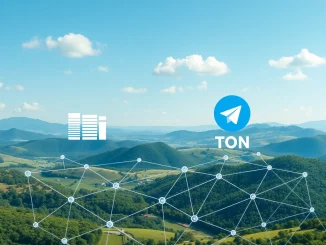
Frustration ripples through the digital asset community as news breaks from South Korea: the much-anticipated security token bill will not be discussed in the current parliamentary session. If you’ve been keenly following the developments in crypto regulation, especially concerning security tokens, this update from South Korea might feel like a setback. Let’s dive into what this delay means and what could be on the horizon for digital assets in the Land of the Morning Calm.
Why the Hold-Up on Security Token Legislation in South Korea?
According to MoneyToday, a South Korean parliamentary official revealed that the bill aimed at regulating security tokens was notably absent from the agenda of the National Policy Committee’s Subcommittee on Legislation Review. This isn’t a dismissal, but rather a postponement. Committee members have expressed that it’s simply “too early” to tackle this issue right now. It’s like putting a pause on a crucial piece of the puzzle, even as the industry eagerly awaits clarity.
Here’s a breakdown of the key reasons behind this decision:
- Need for More Input: The committee is actively seeking broader perspectives from the industry. They recognize the complexity of security tokens and want to ensure any legislation is well-informed and effective.
- Public Hearings on the Horizon: To gather these diverse opinions, the committee is considering methods like public hearings. This suggests a commitment to a transparent and inclusive approach, even if it means a delay.
- Comprehensive Virtual Asset Legislation: The plan is to discuss this security token bill in conjunction with other virtual asset legislation. This indicates a desire to create a holistic regulatory framework rather than piecemeal laws.
Essentially, it’s a strategic pause to ensure they get it right the first time. But what does this mean for the burgeoning security token market in South Korea and beyond?
Understanding Security Tokens: A Quick Primer
For those new to the term, security tokens represent a fascinating intersection of traditional finance and blockchain technology. Unlike utility tokens that grant access to a product or service, security tokens are digital representations of traditional securities, like stocks, bonds, or real estate. They are subject to securities regulations, aiming to offer investors enhanced protection while leveraging blockchain’s efficiency.
Key Characteristics of Security Tokens:
- Represent Ownership: Security tokens signify ownership or rights to an asset, just like traditional securities.
- Subject to Regulation: They fall under securities laws, ensuring compliance and investor protection.
- Enhanced Efficiency: Blockchain technology can streamline processes like issuance, trading, and settlement, making them potentially more efficient than traditional securities.
- Fractional Ownership: Security tokens can enable fractional ownership of assets, opening up investment opportunities to a wider range of investors.

The Ripple Effect of Delayed Crypto Regulation in South Korea
South Korea is a significant player in the global cryptocurrency landscape. Its decisions regarding crypto regulation have far-reaching implications. This delay in the security token bill discussion can have several consequences:
- Uncertainty for Businesses: Without clear regulations, businesses looking to issue or trade security tokens in South Korea face uncertainty. This can stifle innovation and investment in the short term.
- Investor Hesitation: Lack of regulatory clarity might make investors cautious about engaging with security tokens in the South Korean market.
- Potential Brain Drain: If crypto regulation progresses faster in other jurisdictions, South Korea risks losing talent and businesses to more favorable environments.
- Delayed Market Growth: The full potential of the security token market in South Korea might remain untapped until a clear regulatory framework is in place.
South Korea’s Stance on Digital Assets: A Broader Perspective
While the delay in the security token bill might seem like a step back, it’s crucial to view it within the larger context of South Korea approach to digital assets. The committee’s decision to consider this legislation alongside other virtual asset laws indicates a move towards a comprehensive and well-thought-out regulatory framework.
What does this comprehensive approach signal?
- Holistic Regulation: Instead of addressing security tokens in isolation, South Korea aims to create a unified regulatory environment for all virtual assets. This can lead to more consistent and effective regulation in the long run.
- Long-Term Vision: The emphasis on gathering more opinions and holding public hearings suggests a long-term vision for crypto regulation. They are not rushing into legislation but rather taking a deliberate and consultative approach.
- Industry Collaboration: Seeking input from the industry signals a willingness to collaborate and create regulations that are practical and supportive of innovation, while also addressing risks.
Navigating the Future of Crypto Regulation: What to Expect?
So, what can we anticipate in the coming months regarding crypto regulation in South Korea?
Potential Next Steps:
- Public Hearings and Industry Consultations: Expect the National Policy Committee to organize public hearings and actively engage with industry stakeholders to gather diverse perspectives on security tokens and virtual assets.
- Drafting Comprehensive Legislation: Based on the feedback and discussions, the committee will likely work on drafting comprehensive virtual asset legislation that includes provisions for security tokens.
- Inter-agency Coordination: Effective crypto regulation often requires coordination between various government agencies. We might see increased collaboration between financial regulators, tax authorities, and other relevant bodies in South Korea.
- International Benchmarking: South Korea is likely to look at how other jurisdictions are regulating security tokens and virtual assets, adopting best practices and tailoring regulations to its specific context.
It’s a waiting game now, but this pause could pave the way for more robust and well-informed regulations in the future. For businesses and investors in the digital assets space, staying informed and engaging with the regulatory process will be crucial.
Actionable Insights: Staying Ahead in the Evolving Regulatory Landscape
While we await further developments from South Korea, here are some actionable insights for stakeholders in the digital assets space:
- Stay Informed: Continuously monitor news and updates regarding crypto regulation in South Korea and other key jurisdictions.
- Engage in Dialogue: Participate in industry consultations and public hearings when opportunities arise. Your voice matters in shaping future regulations.
- Prepare for Compliance: Even with the delay, regulatory frameworks for security tokens are inevitable. Begin preparing for potential compliance requirements, focusing on areas like KYC/AML, investor protection, and reporting.
- Explore International Opportunities: Consider diversifying your business or investment strategies across jurisdictions with clearer crypto regulation, while keeping a close watch on South Korea developments.
Conclusion: Patience and Preparation in the Crypto Realm
The news from South Korea regarding the delayed security token bill might be perceived as a setback by some. However, it also presents an opportunity for a more considered and comprehensive approach to crypto regulation. Patience is key in the evolving world of digital assets. This pause is not a full stop but rather a strategic moment to gather more insights, refine strategies, and prepare for the future regulatory landscape. By staying informed, engaging actively, and preparing proactively, stakeholders can navigate this evolving environment and capitalize on the immense potential of security tokens and the broader digital assets revolution when the regulatory pieces fall into place.



